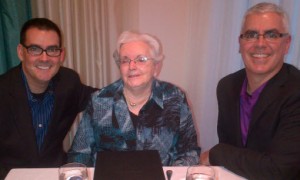David Phipps, RIR-York
In English we have a saying, “Keep it Simple, Stupid” (KISS). While this likely doesn’t translate well en Français, the concept is the same in either language. How do we explain complex terms so that those from outside our fields can understand?
En anglais, nous avons un dicton : “Keep it Simple, Stupid” (KISS). Bien qu’il n’y ait pas de traduction littérale en français, le concept est le même dans les deux langues. Comment expliquer des termes complexes de manière compréhensible à ceux qui ne proviennent pas de notre champ d’activité ?
I struggle explaining knowledge mobilization. I think I am getting better. But apparently I’m not.
Three years ago, I was on the phone with a radio producer who was preparing for an interview and she asked me to explain knowledge mobilization. After two minutes (yes… I was still getting to the point after two minutes) she stopped me and said, “I have no idea what you are talking about”. I never got to the interview.
Last week, I was working with some partners on a story about our work and used the following- York University has developed an institutional capacity in knowledge mobilization that supports research collaborations and enables social innovations. In return my partner’s communications lead said, “Pretty sure this whole phrase could be stated more simply, if I knew what it meant”
There are two (maybe more?) possible problems with that sentence:
- Institutional capacity means we work as an institution not as a collective of individuals. Maybe that’s not clear
- Knowledge mobilization supports research collaborations that enable social innovation
- I think “research collaborations” is self-evident… but maybe not
- the whole piece was about social innovation that was defined so “social innovaton” shouldn’t be a problem
- therefore “research based collaborations (self-evident) that enable social innovation (previously defined) = solutions to unmet social challenges that arise from research collaborations… maybe I should have said that? Why use six words when you can use ten!
Let me point out that my colleagues had no problem with my sentence. It was the communications professional that pointed out the jargon and it is her job to spot these things. Mea culpa.
Perhaps it comes back to the term “knowledge mobilization” which is increasingly used. Sandra Nutley (www.ruru.ac.uk) used knowledge mobilization in a recent post. I asked her about the use of knowledge mobilization instead of her usual term, research utilization. She said, “Our adoption of the term KMb was mainly influence by the increasing use of this term by the funder (of the project), though it also suited our purpose to signal that we were interested in my complex notions of knowledge movement and change that is sometimes implied by KT and KE.”
But this doesn’t help our communications professionals understand what we mean.
Yesterday I received an e mail from a colleague asking me what definition I use for knowledge mobilization. I told her I avoid the use of definitions as they constrain the moment they are employed. Then I gave her the first definition I published, “knowledge mobilisation is a suite of services… that connects researchers and research users to enhance research utilisation” (Phipps, D. J. & Shapson, S. (2009). Knowledge mobilisation builds local research collaborations for social innovation. Evidence & Policy, 5(3), 211-227.)
Check it out… in 2009, I said “knowledge mobilisation is a suite of services… that connects researchers and research users to enhance research utilisation”
In 2013, I said “knowledge mobilization supports research collaborations that enable social innovations”
Six years have passed and I’m using essentially the same jargon.
Time hasn’t helped me communicate knowledge mobilization any more clearly. I continue to struggle with this. To gain perspective of those from outside of our profession, my most recent solution was to talk with my mother’s friends in her seniors’ residence. This is what I have come up with.
Knowledge mobilization helps make research useful to society.
- Helps = it doesn’t do it all on its own, there are other things that need to happen to enhance research use and enable social innovation
- Research = new knowledge created through systematic pursuit of the unknown
- Useful = the “what” – it is able to be used
- Society = the audience, the receptor and ultimate beneficiary of knowledge mobilization.
Knowledge mobilization helps make research useful to society.
My mother understands that. Do you?
 Gary Myers (@KMbeing), Sylvia & David Phipps (@researchimpact)
Gary Myers (@KMbeing), Sylvia & David Phipps (@researchimpact)